| Aleppo(Halab) @Jan/'06 Syria |
| [TOP] [Middle East] [Articles 2006] |
|---|
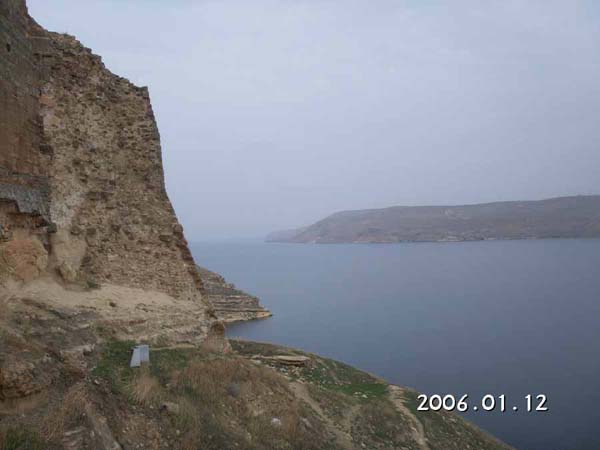
Ruin of Njume Castle: Looking down the River Euphrates
(Located upper part of Lake Assad where still the lake water cover the wide area of both sides of the River bank)
[World Heritage: Ancient City of Aleppo, Culture、registered in 1986] Founded in 10th centuries BC. Dominated important location connecting between Mediterranean and River Euphrates from the old age. This importance made the city flourished as a trading town en route to the other side of the world at the time. It was the capital of Yamhad Empire at the 20th centuries BC. It was then occupied by Hittite tribe. After Alexander's great eastern occupation, reigned by Seleucid Kingdom. As Roman empire became the dominance of the region, it was developed under Roman reign. In 637, invaded by Islam. In 10th centuries, Aleppo became the capital of Hamdan Dynasty. During crusaders invasion to the region in 12 centuries, Aleppo took role as the front line of Islam reign. It was fortified in the front line castle, but originally founded as a shrine. Mongolian empire invaded the city in 13th century. The city was attached by Timor Dynasty afterward. In 16th century, it had started great sailing era, then importance of the land route became declined considerably, and land transportation of the goods declined as well that made the city recessed as time past(translated from Wikipedia Japanese)
It is one of the oldest town in the middle east, and 2nd largest city in Syria. Aleppo has been playing, since very ancient time, an important role as connecting oasis town between east and west, or Mediterranean and the rich crescent area covered by Tigris and Euphrates. I had a chance to visit the ever fascinating, attracting old city on holidays during my stay in neighboring Jordan.
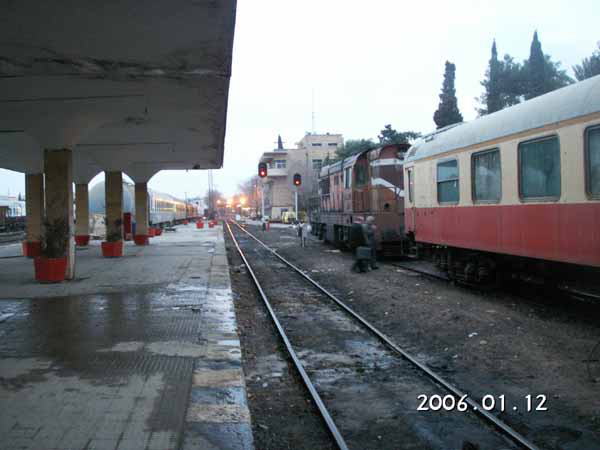
Baghdad Station at Aleppo Railway Terminal
Sleeping cars from Damascus home in Aleppo Baghdad Station in the early morning
In the center of Damascus, there still stands the grand terminal station Hijaji Railway Station with magnificent facade and beautifully decorated interior of fine works in every details. This building is still one of the significant land mark in Damascus that no body makes mistake. to find. This grand station is now under huge reconstruction works, therefore to my disappointment, the train does not arrive and leave the station, but the train leaves and arrive Qadam station some 5km away to the west of the city center. People has to use this Qadam station for travelling to North or South from Damascus by train.
The sleeping express train van for Aleppo departed 00:00 hours at Qadam station of Damascus. Departure of the train was so quite, without bell or any sign. It slowly started moving ahead. There was a slight problem had on boarding the train. I supposed to be in the sleeping car, but I was not, instead, I was in the 1st class passenger car. That was not bad. The seat was wide and comfortable. You can fully stretch your leg straight in front of your seat without any obstacle. But, I wanted to ride in the sleeping car. I requested a ticket for sleeping car when I went to the station in the morning to buy the ticket. The lady in the ticket counter spoke to me in good English. I did not have any doubt that the ticket was wrong one. It was totally my fault that I did not confirmed the ticket when it was issued. Let enjoy the train ride in the 1st class passenger car. It was far better than the seat of air plane. It reclined far back side and could lay my body deep in the reclined seat. Moreover, it was extremely cheap, it cost only 120 Syrian pounds, equal about 2.4 US Dollars only.
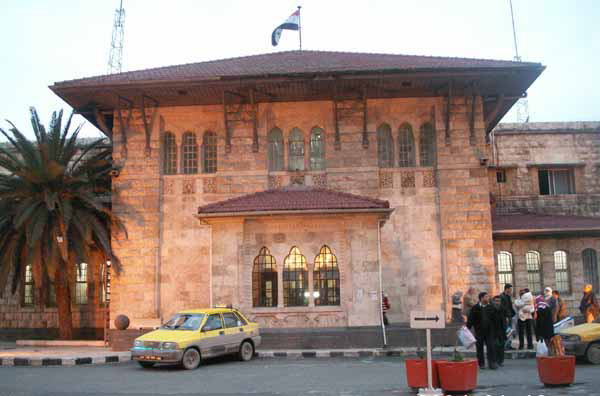
Station building of Aleppo Baghdad Station
Altitude is as same as Amman, about 900 m ASL: The air was cold as the
breath became white
At 6:40, it was just after the dawn. The train had slid into the Baghdad
Station in Aleppo of the morning mist. The scene was just like in the world
of Agatha Christine.
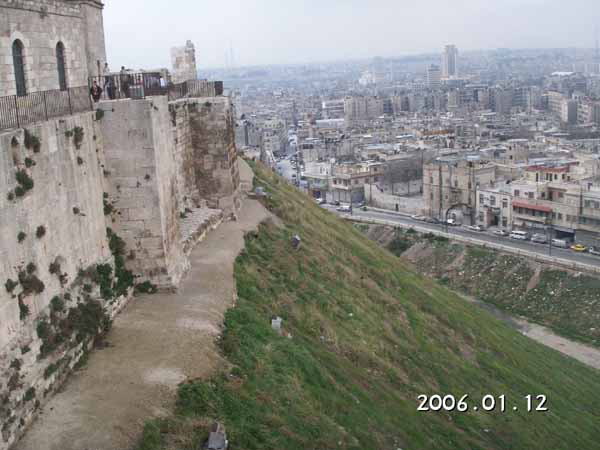
The ruin of Colossal Aleppo (Halab) Castle
The castle was surrounded by high wall and deep mall of its 4km outer premises
After having a short period of tasting the feeling of another world in
the platform, I stepped into the station building. To my surprise, I found
Dr. O was there. I parted the day before at Damascus having the promise
to meet at Hotel Tourist in downtown Aleppo. According to him, Hotel Tourist
is located in the narrow street of downtown Aleppo, and difficult to find,
moreover, as usual, taxi driver does not understand our English nor Arabic
well. Consequently, it is real difficult to find the hotel where we promised
to meet. I really have to appreciate very much of his well thought arrangement
and kindness. The time was so early in the morning. He told me that he
had been in the station since it was dark.
Hotel he checked in is the one, the Tourist Hotel that we promised to meet in at Aleppo. The petite hotel is run by elderly French lady, Ms. Olga, famous and well known to foreign tourists. It is located in the midst of car tires shops street. There is a simple entrance in the ground floor. The hotel rooms are located in 4th and 5th floor. Rooms are probably not more than 10 in total. At reception in 4th floor, there were two kindly looking male staff are serving the guests. There was no room available for me, rooms are fully occupied. To my lucky, Dr. O kindly offered to share the room with him. No meals are provided in the hotel, but it is clean and comfortable enough to stay over night. Charge was also very reasonable, only 700 Syrian pounds, approx, 14 US Dollars per room, it cost 350 Syrian pound, approx, 7 US Dollars per head per night.
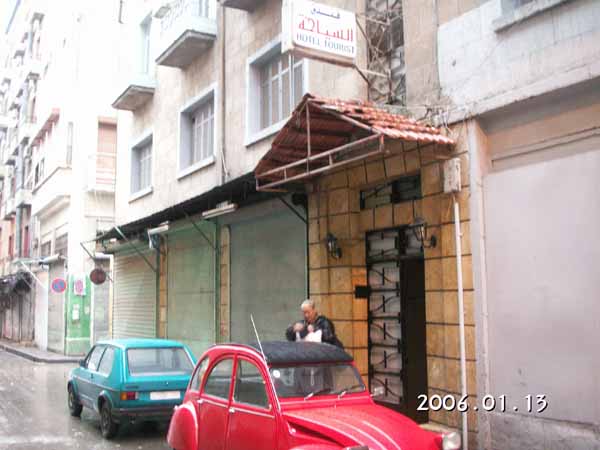
"Tourist Hotel" was located in the narrow street of tires shops
Owned by elderly French madam Olga, a petite hotel is well known to foreign
tourists
As soon as I checked in the Tourist Hotel, we departed Aleppo heading for one of our main itinerary of this trip, Euphrates River some 120 km east of Aleppo. There is a ruin of the castle Njume, "Castle of Star" on the west bank of Euphrates River. .There is no any other means of transportation than taxi for the tourist who has only limited time to spend.to travel 120km east of Aleppo. There might be service taxies or buses, but these are operated on non-regular time schedule basis, and not fit for the tourists who is usually in rush. The taxi driver who is well acquainted to the hotel was busy with another engagement, so he stopped one of the taxi in town and explained to the driver where we planed to go and negotiated the price for the ride. The negotiation was settled by 1,000 Syrian pounds (Approx, 20 US Dollars) return way. We noticed that we still did not have breakfast. The taxi driver brought us one of the sandwich shop that had opened at the time, 7 o'clock in the morning. We bought two sticks of cheese chicken sandwiches each, one stick cost only 10 Syrian pounds. (0.2 US Dollars)
The driver's behave seemed not quite alright. He stopped the car on the
way, some 40 km away from Aleppo. He asked something in Arabic to the local
people several times. We wondered if he did not know the place where we
were going. Our suspicion would be the right one. This often happen in
the region. One willingly say to do so whatever we requested, but actually
he/she had no ability do so or did not have single idea on it. This is
not his/her intention from the beginning. He/She, in the beginning, really
wanted to help us or provide the service, but he/she realizes afterward
that he/she could not do it. This is one of the culture gap between east
and west, and could cause the misunderstanding between the two. After he
had asked several times to local people and traffic police, he finally
got confidence that where he was heading. He drove the main road stretching
long ahead to the east. After driving an hour and a half, there was small
sign board on the right hand of the road. It seemed that the name of the
old castle where we were going was written on the sign board in Arabic.
The driver found it proudly and informed us that the road was correct.
The car turned to the right after the sign board. The road was narrow and
unpaved cutting in the green wheat field. Suddenly front of us, the shining
surface of water were looked, in about 20 minutes. It must be the Euphrates.
The shining surface gradually becoming large. The present Euphrates is
retained near the Iraq border and produced a large Assad lake. The shining
refraction of the surface was of that Assad lake.
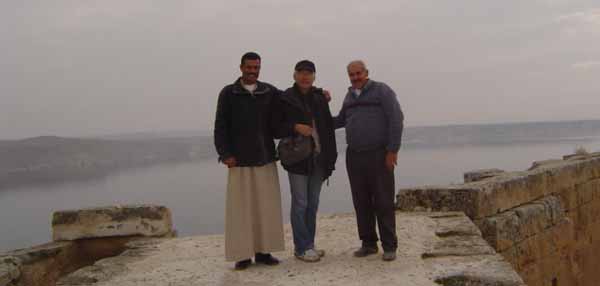
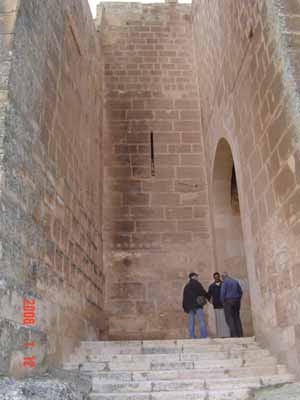
At the top of the ruin of Njume Castle: Together with the guide and the
driver Inside the castle: There are many rooms
After a while we went through the green field, suddenly a ruin of castle
came into our eyes some half miles ahead. It must be the ruin of Castle
of Star, Al Cala Njume. River Euphrates was the front line since ancient
time, of Babylon, of Assyria, Akemnes Persian Empire, of Sasan Parisian
Empire, of Byzantine, of Serjuke Turkey, of Ottoman Turkey and etc. This
castle was used by numbers of generals like Sarhadeen of Arabia and others
as their strong hold or front lines. You can see the blue Euphrates from
the roof of the ruin, that dividing the desert land into two parts.
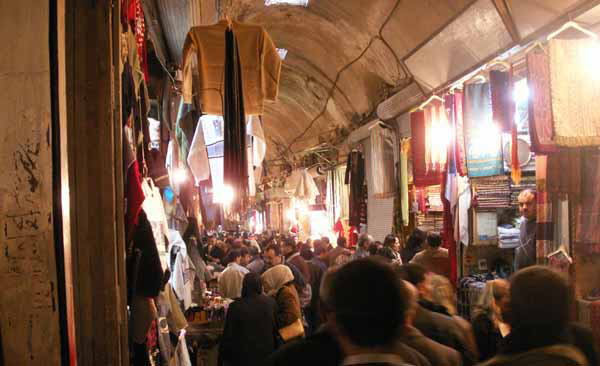
Famous suq (market) covered by stone roof stretches 1.5km west of the Castle
It was as crowded as most busiest days in Tokyo: heavily packed with shoppers
all over
Back from the Euphrates to Aleppo, we asked to the taxi driver to divert the car to the giant ruin of Aleppo Castle surrounded by deep moat extended to 4km at ancient time. To our surprise, the taxi driver did not understand what we had asked him. Castle of Aleppo must be so famous and common for everyone of foreigners and locals. But he did not understand where we go despite we repeatedly mentioned the name of Castle. Finally, we said it in another name, Halab, then he immediately understand where to go. We reckoned that locals never say the city Aleppo but call it Halab, the old name of the city. We paid him 1,500 Syrian pounds (30 US Dollars). This is 500 Syrian pounds (10 US Dollars) more than we agreed when we departed Aleppo in the morning as a tip for his work of the day. The taxi meter indicated 1,700 Syrian pounds (34 US Dollars), so we bargained 200 Syrian pounds in the end.
There are several restaurant in front of the main gate of Aleppo Castle.
We sit down in one of the the terrace restaurants. It was wet winter season.
So, we thought that there would not be much of dusts in the air even in
the terrace seat, and it would be hygiene enough. We sat down beside the
kerosine stove to keep us warm. We stretched our foot in full length and
enjoyed openness of the air looking colossal Aleppo Castle in front of
us, after 5 and half hours drive to/from Euphrates.
There is only one gate to the castle. A large reinforced wood door covered
fully with countless horse shoes. Entrance fee was 150 Syrian pounds (Approx.
3 US Dollars) for foreign visitors. We stepped into the old castle. The
ceiling was high, passage to the inside of the castle was made like labyrinth.
After passing many sharp turns and stair steps, finally we reached inside
of the castle. We entered together with Spanish tourists group of about
ten member led by Spanish speaking tour guide. I looked for English leaflet,
but it was in vain. Even no leaflet of Arabic neither. The history of the
castle must be from very old age. Probably, it must had been standing here
from the age of Babylon, Assyrian, Byzantine, and Islamic, experiencing
long revolving history. The magnificent panoramic views can be observed
from the top of the castle that is standing on only the mounding hill in
the rather flat city of Aleppo.
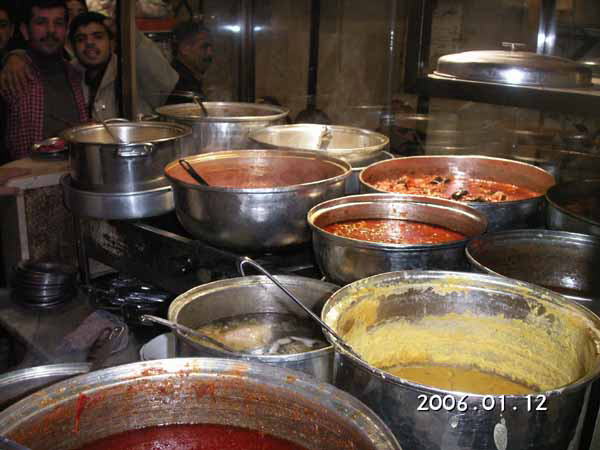
Pans of long time boiling
Variety of foods were boiled for long time: these must be very tasty
The suq visit is a must after visiting the castle. Suq, market is located
in the westward street of 1.5 km length in straight and slightly down road.
The market is covered with stone ceiling since ancient time. Countless
small shops parallel along the both side of the narrow street. Sales man
of the carpet shop found us as Japanese at a glance, and called us in with
loud Japanese words, "Maido, Yasui," These words are often used
by Osaka merchant in Japan. The street was covered by stone. When we visited
there, the street stone was uncovered, probably, in water pipe construction
or repair works. People there, in most cases, never take care for other
people or customer whatever inconveniences happen to the people by the
works, like uneasy to walk, dangerous to walk, muddy to walk or whatever
that makes people inconveniences. It is winter, the rainy season. There
was not raining that day, but the rain water came into the street even
the ceiling was covered by stone. The uncovered portion of the street was
temporally covered by soil, but it was soaked with rain water of days earlier
and became so muddy. It was extremely uncomfortable to walk the street
with normal shoes. In addition. there were tremendous number of local shoppers.
It just like bustling "Ameyoko Street in the last day of the year",
the most busiest street in downtown Tokyo. The shoes got total muddy, the
street was crowded just like sardine pack. This is the suq once enjoyed
top status in every aspects among the the all middle east area.
It is now in the mid of "Eed Al Adoha: The festival of Sacrifice".
I tend to avoid passing in front of butchers. Because parts of sacrificed
body of the sheep are spread over the road in front of butchers, and the
road colored with fresh blood of the sacrificed animal. In addition, rain
water mixed with the blood. I am overwhelmed with so unusual and unpleasant
atmosphere whenever I passed one of these places.
There was an antique shop at the end of the suq. The shop was obviously
far from luxurious and expensive one, things displayed on the shelves were
looked all junks and have a scant value. Shop owner had never flattered
to the customers. He was only busy repairing an old open reel tape recorder.
His tools were simple and limited like screw driver and pryer only. After
a while, we looked into the untidy crowded shelves, the sound came out
from the old tape recorder. The sound was distorted very much and never
reach to the level of high fidelity. But he seemed so satisfied with the
results of his works. They still have something we lost long time ago,
the passion for the things. I found an old oil lamp lusted in black color.
It was of course an imitation one. I bought it at 200 Syrian pounds (Approx.
4 US Dollars), after several bargaining bringing the price down to the
half from the price he showed in the beginning. This was the only one souvenir
from Aleppo to myself.
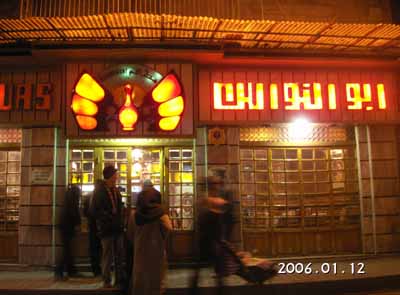
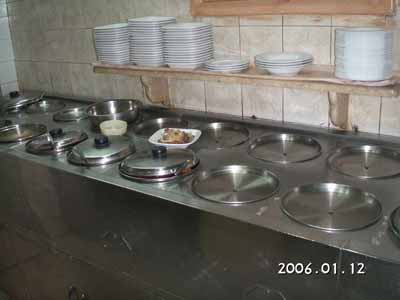
Boiling pan restaurant "Abo Nawas"
Located few minutes walk from the "Tourists Hotel"
Back to the hotel, shaved and took quick shower. It was a long day, on arriving to Aleppo by night train, then went straight to Euphrates by taxi, then returned to Aleppo, visited Aleppo Castle and old Suq. Dr. O made a n instant coffee for me with portable water heater. The coffee tasted a real good just like coffee served at the five star hotel. After the short rest at the hotel, the dusk was approaching the sky. We went out to the town looking for something good for stomach to finish the day. Somebody told me in Aleppo, pan cooking, "Tabaha" in local language, is good. Let's try pan dishes tonight.
A man of the hotel taught us "Abo Nawas" is one of the best pan
cooking, "Tabaha" restaurant in Aleppo. Abo Nawas was few minutes
walk from the hotel. The entrance of the restaurant looked quite a fashionable
and high class one. We entered into the restaurant. Atmosphere of the inside
was chic in black color based wood interior. On the high ceiling, fine
art decoration was curved, engraved or printed. There were two groups of
diners already in their table. We asked the master, whether they have pan
cooking "Tabaha" in the menu. The master proudly introduced us
to the kitchen. There were score of pans were neatly arranged in the kitchen,
each pan contained different foods cooked for long time. The chef opened
the lid of each pan and explained us the contents in it. We ordered several
kind of foods in the pans, like chicken, molokheiya, arico ver, beans,
mutton. The "Tabaha" is the set menu. In addition to the pan
cooking, large round thin breads, bean paste and kind of pickles were served
as a set. The taste was good. We enjoyed famous Syrian Tabaha which cost
700 Syrian pound, approx, 14 US Dollars, for two. It must be expensive
for the local people whose average earnings is around 100 to 200 US Dollars
per month.
We strolled down town after the dinner. We had found the pan cooking stall
what we really looked for, along the street. The stall was small and lousy
but looked just fascinated our taste for foods. We had a little regret
that we did found the stall after we finished our dinner of the day. We
parked our foot at the Baron Hotel once it was regarded as premier hotel
in the middle east when it was grand open. The building was very old and
some parts are bad needed renovation works. The only good things were high
ceiling and history rich atmosphere filled in the building, and highly
professional waiter in black suit. Normal tourists tend to look for something
easy, cheap and contemporary plastic fashion, none of these this old hotel
possesses. Naturally, only rich and old people who really understands the
value of the hotel stays in. We sat down in the old chair of the very old
fashioned bar, and shipped a cup of tea remembering long period of time
the room had experienced through the history.
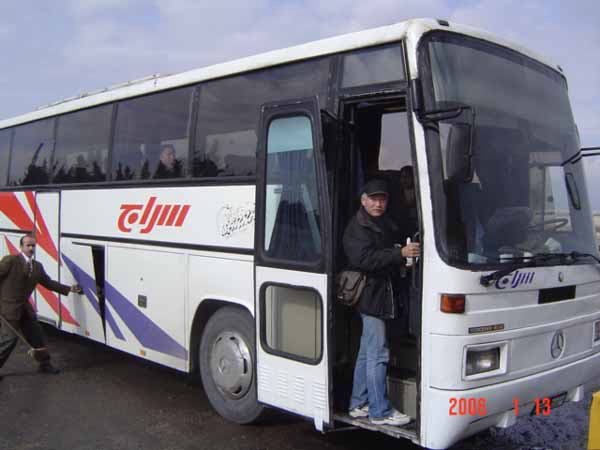
Bus connecting Aleppo and Damascus (400km)
Got into bus of United Bus Company (Costs only 165 Syrian pound: US$ 3)
The next morning, we went to the bus terminal, "Hanano", to catch the bus back to Damascus, some 400km away from Aleppo. We were little shocked that the bus service was held because of shortage of vehicles. That was during the Hajji Holidays, so many people went to Mecca Saudi Arabia for pilgrim trip, so most of the buses of the company used for them, and no bus available for the operation between Aleppo and Damascus, today of the company. This has never happen in the western world standards, but the standards in countries of the area are different than ours, the most priorities are put on religious order, and normal life are put in the secondary order. To our relief, there are several other bus company that run the service between Aleppo and Damascus. We walk around the bus center looking for other company who provides service that we wanted. Finally we found a United Bus Company who could brought back us to Damascus that day. I surprised again at the ticket counter of the bus company. A man in the ticket booth with thick mustache asked me in real French, "Common tu ta appel?" I never expected to hear French language from aged Arabic man his face covered of thick mustache. I always expect to hear French in my ear from young French madomoisser. It gave me a strange feeling but I felt quite comfortable hearing understandable language in entirely unexpected situation.
Anti-Lebanon Ranges were becoming large in the right hand side of the road as the bus approaching to Damascus. The altitude of the road was elevated gradually and finally reached to 1640m according to the altitude meter mounted in the wrist watch.
Bus stopped once at a large drive-in restaurant along the way for toilet
and snack. After 4 and half hours, we had arrived at Damascus bus terminal
safely.
It was a really wonderful trip to Syria with full of fascinating experiences
and findings, helped by many kind local people in Damascus and Aleppo.
Thanks to the people and great history of Aleppo and Damascus.
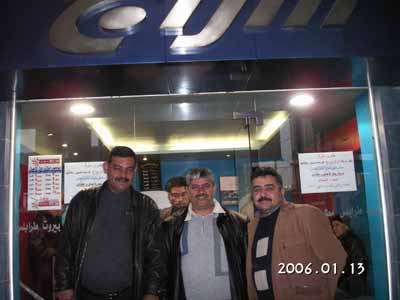
At ticket office of United Bus Company in Aleppo
12/Jan/'06 Rinzo @Aleppo (Halab) Syria (Updated on 29/Mar/'06)
| [TOP] [Middle East] [Articles 2006] |
|---|
| [Back to Page Top] |
|---|